#the Grimké Sisters
Text
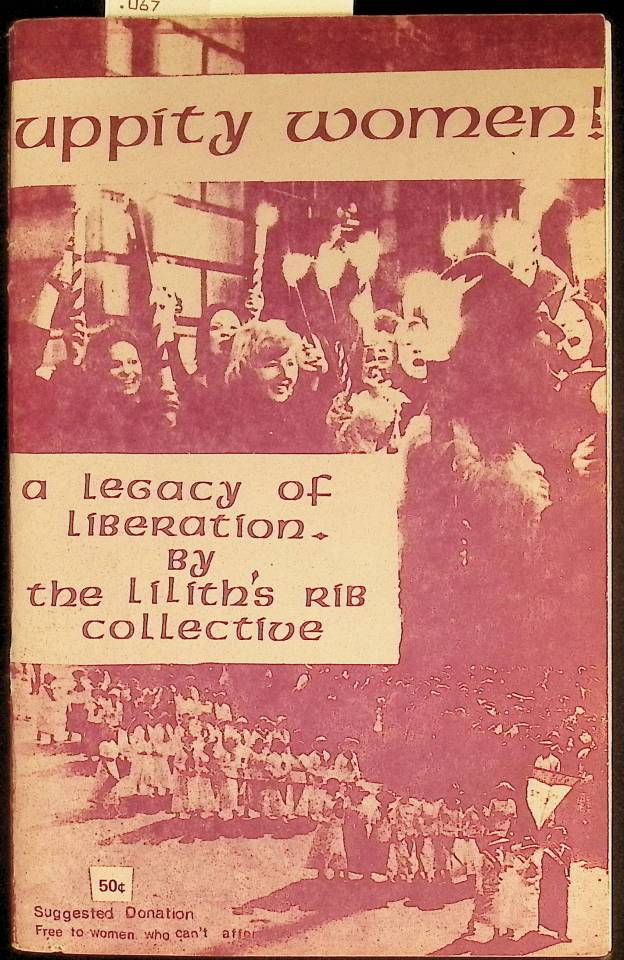
Uppity Women: A Legacy of Liberation (1974) by the Lilith's Rib Collective at Hunter College
From the introduction:
We are a group of women students at Hunter College who are working for the implementation of a Women's Studies Department at Hunter. Given an enrollment that is 73% women and a long background as a women's college, we feel that it is time for us to learn about our HERitage and with this goal in mind we are working both politically and educationally.
We have chosen to name ourselves after Lilith. She was first mentioned in Assyrian myths as a wind spirit and later played a major part in early Hebraic lore. She is mentioned in the Alphabet Ben Sira as the first woman, created simultaneously with Adam. Being thus created, Lilith refused to accept Adam's claim of supremacy and left him, after refusing to lie beneath him during intercourse. She went to live by the Red Sea. We have chosen her as a symbolic starting point to our heritage.
Our motivation to write this book comes out of our own experiences as women. It is an effort to connect with a rich past that has been denied us. Our purpose is to briefly introduce you to some of these women whose lives have been lost to us and who were the Foremothers of our Woman's Culture. We hope that this will encourage you to rediscover Women's history and to participate in the struggle that lies ahead.
In Sisterhood,
The Lilith's Rib Collective
It includes biographies of Susan B. Anthony, Mary McLeod Bethune, Marie Sklodowska Curie, Isadora Duncan, Amelia Earhart, Emma Goldman, the Grimké Sisters, Anne Hutchinson, Mother Jones, Maria Mitchell, Esther Hubart Morris, Emmeline Goulden Pankhurst, Sacajewa, Margaret Higgins Sanger, Gertrude Stein, Lucy Stone, Sojourner Truth, Harriet Ross Tubman, Mercy Otis Warren, and Victoria Woodhill.
The Browne Popular Culture Library (BPCL), founded in 1969, is the most comprehensive archive of its kind in the United States. Our focus and mission is to acquire and preserve research materials on American Popular Culture (post 1876) for curricular and research use. Visit our website at https://www.bgsu.edu/library/pcl.html.
#bgsu#libraries on tumblr#women's history month#uppity women#lilith's rib collective#hunter college#Susan B. Anthony#Mary McLeod Bethune#Marie Sklodowska Curie#Isadora Duncan#Amelia Earhart#Emma Goldman#the Grimké Sisters#Anne Hutchinson#Mother Jones#Maria Mitchell#Esther Hubart Morris#Emmeline Goulden Pankhurst#Sacajewa#Margaret Higgins Sanger#Gertrude Stein#Lucy Stone#Sojourner Truth#Harriet Tubman#Mercy Otis Warren#and Victoria Woodhill#marie curie
11 notes
·
View notes
Text
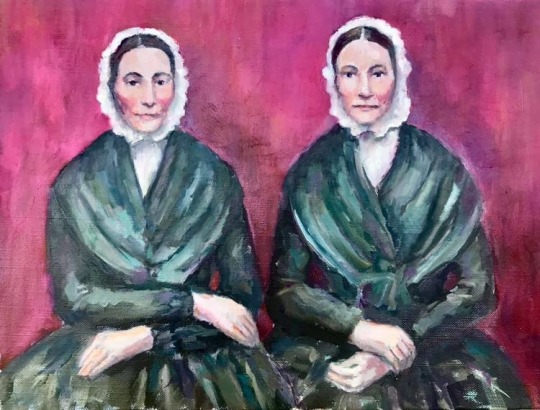
The Grimké Sisters by Allison Adams
Sarah Moore Grimké (1792–1873) and Angelina Emily Grimké (1805–1879), known as the Grimké sisters, were writers, orators, and educators—the first American female advocates of abolition and women's rights. Breaking from the southern slaveholding family they were born into, they chose to become Quakers, where, as women, they were allowed to speak out against slavery and for equal rights.
#the Grimke sisters#the grimké sisters#allison adams#Sarah grimke#Angelina grimke#Sarah grimké#Angelina grimké#art#artwork#herstory#women in history#irl women/girls
10 notes
·
View notes
Text
The single most impressive fact about the attempt by American women to obtain the right to vote is how long it took. From its earliest beginnings in the public speaking of Fanny Wright in the 1820s and the Grimké sisters in the 1830s, through the complex history of equal rights suffrage associations led by such woman's-rights pioneers as Lucy Stone, Susan Anthony, and Elizabeth Stanton, it was indeed a "century of struggle" (Flexner 1959) before the suffrage amendment to the Constitution was ratified and women could first participate in a national election. Of the first generation pioneers, only Antoinette Brown Blackwell lived to cast her ballot in that first election in 1920.
-Alice S. Rossi, The Feminist Papers: From Adams to de Beauvoir
252 notes
·
View notes
Text
Sarah Parker Remond (June 6, 1826 – December 13, 1894) was an American lecturer, activist and abolitionist campaigner.
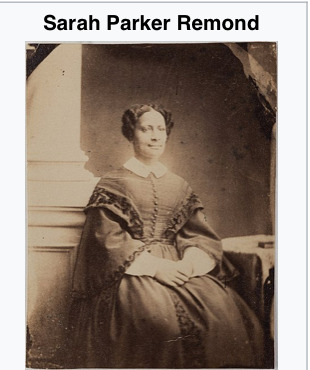
Born a free woman in the state of Massachusetts, she became an international activist for human rights and women's suffrage. Remond made her first public speech against the institution of slavery when she was 16 years old, and delivered abolitionist speeches throughout the northeastern United States. One of her brothers, Charles Lenox Remond, became known as an orator and they occasionally toured together for their abolitionist lectures.
Eventually becoming an agent of the American Anti-Slavery Society, in 1858 Remond chose to travel to Britain to gather support for the growing abolitionist cause in the United States. While in London, Remond also studied at Bedford College, lecturing during term breaks. During the American Civil War, she appealed for support among the British public for the Union and their blockade of the Confederacy. After the conclusion of the war in favor of the Union, she appealed for funds to support the millions of the newly emancipated freedmen in the American South.
From England, Remond went to Italy in 1867 to pursue medical training in Florence, where she became a physician. She practiced medicine for nearly 20 years in Italy and never returned to the United States, dying in Rome at the age of 68.
Early years
Born in Salem, Massachusetts, Remond was one of the between eight and 11 children of John Remond and Nancy (née Lenox) Remond.[1] Nancy was born in Newton, daughter of Cornelius Lenox, a Revolutionary War veteranwho had fought in the Continental Army, and Susanna Perry.[2] John Remond was a free person of color who immigrated to Massachusetts from the Dutch colony of Curaçao as a 10-year-old child in 1798. John and Nancy married in October 1807, in the African Baptist Church in Boston. In Salem, they built a successful catering, provisioning, and hairdressing business, becoming well-established businesspeople and activists.
The Remonds tried to place their children in a private school, but they were rejected because of their race. When Sarah Remond and her sisters were accepted to a local high school for girls which was not segregated, they were expelled, as the school committee was planning to found a separate school for African-American children. Remond later described the incident as engraved in her heart "like the scarlet letter of Hester."[1] In 1835, the Remond family moved to Newport, Rhode Island, where they hoped to find a less racist environment in which to educate their children. However, the schools refused to accept black students. Instead, some influential African Americans established a private school, where Remond was educated.[1]
In 1841, the Remond family returned to Salem.[1] Sarah Remond continued her education on her own, attending concerts and lectures, and reading widely in books, pamphlets and newspapers borrowed from friends, or purchased from the anti-slavery society of her community, which sold many inexpensive titles.[3] The Remond family also took i
n as boarders students who were attending the local girls' academy, including Charlotte Forten (later Grimké).[4]
Three of Remond's sisters built a business together: Cecilia (married to James Babcock), Maritchie Juan, and Caroline (married to Joseph Putnam),[4] "owned the fashionable Ladies Hair Work Salon" in Salem, as well as the biggest wig factory in the state.[5] Their oldest sister Nancy married James Shearman, an oyster dealer. The Remond brothers were Charles Remond, who became an abolitionist and orator; and John Remond, who married Ruth Rice, one of two women elected to the finance committee of the 1859 New England Colored Citizens' Convention.
Anti-slavery activism and lecturing
Salem in the 1840s was a center of anti-slavery activity, and the whole family was committed to the rising abolitionist movement in the United States. The Remonds' home was a haven for black and white abolitionists, and they hosted many of the movement's leaders, including William Lloyd Garrison and Wendell Phillips, and more than one fugitive slave fleeing north to freedom. John Remond was a life member of the Massachusetts Anti-Slavery Society.[2] Sarah Remond's older brother Charles Lenox Remond was the first black lecturer of the American Anti-Slavery Society's and considered a leading black abolitionist. Nancy Remond was one of the founders of the Salem Female Anti-Slavery Society.[1] Nancy not only taught her daughters the household skills of cooking and sewing but also to seek liberty lawfully; she wanted them to take part in society.[3] With her mother and sisters, Sarah Remond was an active member of the state and county female anti-slavery societies, including the Salem Female Anti-Slavery Society, the New England Anti-Slavery Society, and the Massachusetts Anti-Slavery Society. She also regularly attended antislavery lectures in Salem and Boston.[2]
With the support and financial backing of her family, Sarah Remond became an anti-slavery lecturer, delivering her first lecture against slavery at the age of 16, with her brother Charles in Groton, Massachusetts, in July 1842.[6] Remond rose to prominence among abolitionists in 1853, when she refused to sit in a segregated theater section. She had bought tickets by post for herself and a group of friends, including historian William C. Nell, to the popular opera, Don Pasquale, at the Howard Athenaeum in Boston.[7] When they arrived at the theatre, Remond was shown to segregated seating. After refusing to accept it, she was forced to leave the theatre and pushed down some stairs.[3] Remond sued for damages and won her case. She was awarded $500, and an admission by theatre management that she was wronged; the court ordered the theater to integrate all seating.[7][8]
In 1856, the American Anti-Slavery Society hired a team of lecturers, including Remond; Charles, already well known in the U.S. and Britain; and Susan B. Anthony, to tour New York State addressing anti-slavery issues. Over the next two years, she, her brother, and others also spoke in New York, Massachusetts, Ohio, Michigan and Pennsylvania.[2] She and other African Americans were often given poor accommodation due to racial discrimination.[3] Although inexperienced, Remond rapidly became an effective speaker. William Lloyd Garrison praised her "calm, dignified manner, her winning personal appearance and her earnest appeals to the conscience and the heart."[9] Sarah Clay wrote that Remond's every word "waked up dormant aspirations which would vibrate through the ages."[1] Over time, she became one of the society's most persuasive and powerful lecturers.[10]
Abby Kelley Foster, a noted abolitionist in Massachusetts, encouraged Remond when they toured together in 1857.[11] On December 28, 1858, Remond wrote in a letter to Foster:[12]
I feel almost sure I never should have made the attempt but for the words of encouragement I received from you. Although my heart was in the work, I felt that I was in need of a good English education ... When I consider that the only reason why I did not obtain what I so much desired was because I was the possessor of an unpopular complexion, it adds to my discomfort.
see rest of article
#Sarah Parker Remond#June 6#june 6 1826#Women in history#Black women in history#Black women in the Abolitionist movement#Black women in medicine
9 notes
·
View notes
Text
The Grimke sisters
-Aanya and Sara
Angelina Grimke - “I know you do not make the laws, but I also know that you are the wives and mothers, the sisters and daughters of those who do; and if you really suppose you can do nothing to overthrow slavery, you are greatly mistaken.”
The Grimke sisters were among the first women to speak in public against slavery, defying gender norms and risking violence in doing so. Beyond ending slavery, their mission—highly radical for the times—was to promote racial and gender equality. The two sisters became the first women to speak in front of a state legislature as representatives of the American Anti-Slavery Society.
Childhood
The Grimke sisters were raised in the cradle of slavery on a plantation in South Carolina, as they were known, and grew to despise slavery after witnessing its cruel effects at a young age. They tried helping teach the enslaved people how to read until her father did not permit her to do so, which is when they started seeing the dark side of how badly African Americans were treated.
The Grimke sisters started to explore the vast ideologies of feminism and women's rights as well as being advocates of anti-slavery ideologies by joining anti-slavery groups in 1836. Angelina Grimke wrote her first booklet called, “An Appeal to Christian Women of the South” (1836) and Sarah also published her first booklet shortly called “Epistle to the clergy of the southern states” (1838) which addressed their concerns on abolishing slavery. Their most notable and historic works include “Letters on the equality of the sexes and the conditions of women” which talked about the poor treatment of women.
Grimké continued to fight for women’s rights and the fair treatment of African Americans for the rest of her life. She was the vice president of the Massachusetts Woman Suffrage Association in 1868. A few years later, she led a group of women in Hyde Park, Boston to vote in the local election even though it was against the law
Sarah Grimke died at the age of 81 in December of 1873. Angelina, who had been paralyzed for several years because of a stroke, died on October 26, 1879. The two had lived to see the end of slavery and the rise of a women’s rights movement. In 1863, Over her lifetime her work had been guided by a vision that both racial and gender equality would one day be realities. Sarah and Angelina wanted to advance the causes of abolition and women’s rights at the same time. Many abolitionists were uncomfortable with the idea of women achieving political and social equality. They never let that stop them from achieving equality.
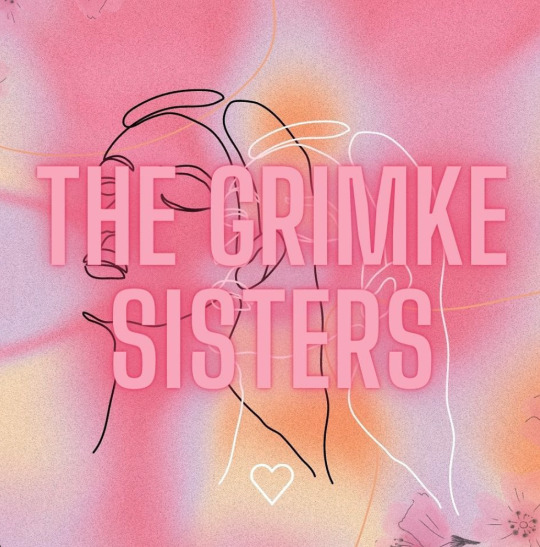
2 notes
·
View notes
Text
It's worth noting there were a very few Southern white abolitionists:
They did not, if they wanted to die of old age, live in the South very long after they started criticizing the Slave Power. Such was the fate of the Grimke sisters, who were in that original generation of anti-slavery activists. They were also up there with William Lloyd Garrison in being radicals who viewed equal rights as just that and the closest to marching in step with contemporary Black activists. Most abolitionists refused to accept the institution of chattel slavery but not wanting a man (phrasing intentional) to be enslaved did not mean they wanted him equal and the women were invisible then as now.
#lightdancer comments on history#women's history month#united states and women's history#grimke sisters
0 notes
Photo
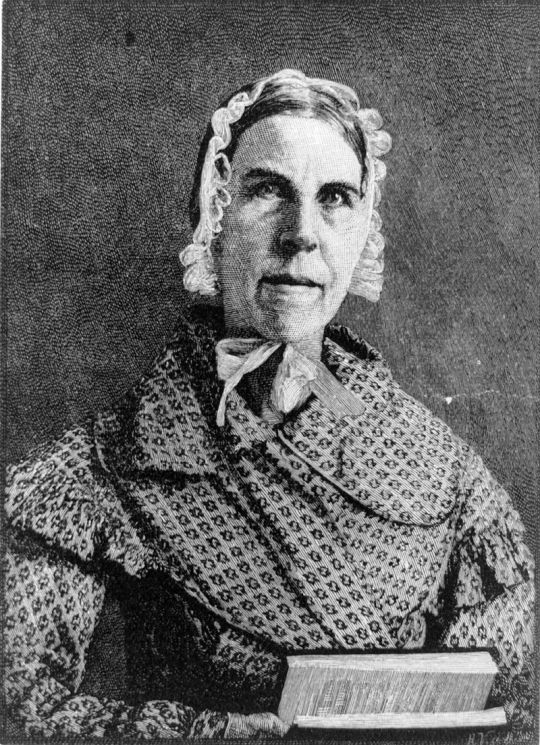
Sarah Moore Grimké (November 26, 1792 – December 23, 1873) was an American abolitionist, widely held to be the mother of the women's suffrage movement. Born and reared in South Carolina to a prominent, wealthy planter family, she moved to Philadelphia, Pennsylvania, in the 1820s and became a Quaker, as did her younger sister Angelina. The sisters began to speak on the abolitionist lecture circuit, joining a tradition of women who had been speaking in public on political issues since colonial days, including Susanna Wright, Hannah Griffitts, Susan B. Anthony, Elizabeth Cady Stanton, and Anna Dickinson. They recounted their knowledge of slavery firsthand, urged abolition, and also became activists for women's rights.
#Sarah Moore Grimké#women in history#womens rights#XVIII century#XIX century#people#portrait#photo#photography#Black and White
1 note
·
View note
Photo
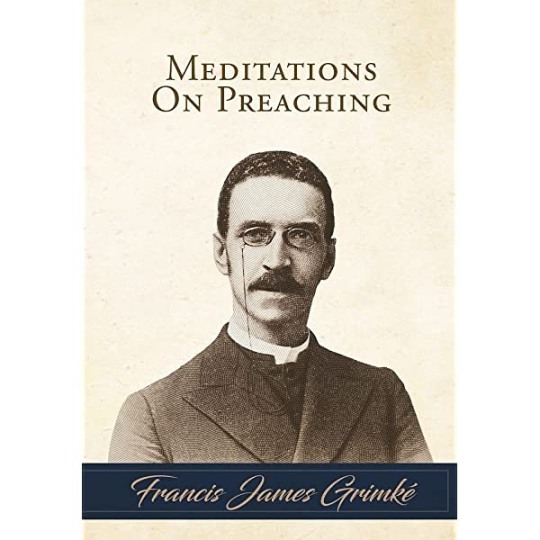
Francis James Grimké (October 10, 1850 – October 11, 1937) was a Presbyterian Minister in DC. He was regarded for more than half a century as one of the leading African-American clergies of his era and was prominent in working for equal rights. He was active in the Niagara Movement and helped found the NAACP in 1909. For was the second of three sons born to Henry Grimké, a white (European-American) slaveholder of Charleston, and Nancy Weston, an enslaved woman of European and African descent. She was his official domestic partner in the house and she and her children were his slaves. Both Henry and Nancy gave Francis and his brothers -- Archibald and John—their first lessons in reading and writing. Henry Grimké had come from a large family. Among them were two sisters, Sarah and Angelina Grimké, who had become abolitionists and moved to the North to join activists there. His other siblings continued to represent and carry out the expected roles, as he mostly did, of their prominent slaveholding family of Charleston. He and Archibald both graduated from Lincoln University in 1870. He went on to graduate studies at Princeton Theological Seminary, from which he graduated in 1878. He became pastor of the Fifteenth Street Presbyterian Church in DC, a post he held until 1928. On Christmas Eve, 1918, he delivered the sermon below summarizing the aims and objectives of WWI as well as its potential impact on the darker races of the world. #africanhistory365 #africanexcellence https://www.instagram.com/p/CjigZ5qL6Yo/?igshid=NGJjMDIxMWI=
0 notes
Text
from the virtuous solemnity and gravity of this act
No one is going to cater to an in between hodgepodger because it's not financially beneficial to do so.Or, at least, this is how I have always justified my complete and utter lack of style. Until recently, that is. Somehow, over the biciclete pret last few years, that which is fashionable has suddenly suited me well. “Don’t be angry with me, my friend! You are angry at something, aren’t you? Merely at something external, isn’t it? Why, you expected nothing else of me in substance, however I might have spoken to you, with perfumed courtesy, or as now; so the drift would have been the same in any case. You despise me, don’t you? You see how much charming simplicity there is in me, what candour, what bonhomie! I confess everything to you, even my childish caprices. Yes, mon cher, yes, a little more bonhomie on your side too, and we should agree and get on famously, and understand one another perfectly in the end. Big Walder and Little Walder, yes. Now, would not anybody think, from the virtuous solemnity and gravity of this act, that it was intended in some way to amount to something? Let us give a little sketch, to show how much it does amount to. Angelina Grimké Weld, sister to Sarah Grimké, before quoted, gives the following account of the situation of slaves on plantations:[12]. “Not the Skahazadhan. The river has been closed to us. He’d killed him. He is an excellent house servant, very handy about a hotel,—tall, slender, and has rather a down look, especially when spoken to, and is sometimes inclined to be sulky. I have no doubt but he has been decoyed off by some scoundrel, and I will give the above reward for the apprehension of the boy and thief, if delivered at Chattanooga. I am too old for such fancies, he told himself. Then, for lack of any other books, he started reading them again. Dead things in the water. “How many men are enough?” he asked Leathers. point de croix chalet The expression “unusual rigor” nike hip pack is suggestive, again. It will afford large latitude for a jury, in states where slaves are in the habit of dying under moderate correction; where outlawed slaves may be killed by any means which any person thinks fit; and where laws have to be specifically made against scalding, burning, cutting out the tongue, putting out the eye, &c. fehér női bőr csizma This Methodist Church subsequently broke into a Northern and Southern Conference. Many of our schools and colleges are willing to receive the colored applicant on equal terms with the white. Some of the Northern free states accord to the colored free man full political equality and privileges. Some of the colored people, under this encouragement, oneil mellényhave, in many parts of our country, become rich and intelligent. A family used their skills with leather that have been passed down from one generation to the next to make these amazing bags. Today, these bags are still made with the finest craftsmanship. This is one of the main reasons why these bags are becoming more and more popular, as people from all classes are trying to get their hands on them. The mall has been taken over by Star Wars products. Penney has plush Star Wars dolls scattered about the women's apparel section. There are Star Wars bears at Build A Bear (so cute). “What is the mystery?” I thought.. “… they lose their ships, oftimes their very lives. The seas are dangerous, and never more so than in autumn. And I speak as frankly to you as I would speak
cizme din denim
to myself because for one thing you are a splendid man and I know about your past, with Natasha, before Alyosha’s time, and I cried when I heard about it.”. This can only be upon the principle, that they are men and rational beings. The Roman law has been much relied on by the counsel of the defendant. “Not all,” said Jaime. “Lord Eddard’s daughters live. I hope not. The second important criteria you must keep in mind is izraeli kézműves ékszerek that the bag must be designed to last for several years to come. The seams of the bag must be well stitched, and the material used must be durable, waterproof, and resistant to tearing and adidas retro schuhe scaun rulant inchiriere männer damage. The lining of the bag must be soft so that the fiber does not scratch the lenses. There are those who yet retain the delusion that, somehow or other, without any very particular effort or mini melissa picole vidro opposition, by a soft, genteel, rather apologetic style of operation, Leviathan is to be converted, baptized and Christianized. They can try it. Such a style answers admirably as long as it is understood to mean nothing. He enlarged on his idea warmly, excitedly. “Then who, if not Unsullied? Dothraki would be even worse.” Dothraki fought from horseback. Mounted men were of more use in open fields and hills than in the narrow streets and alleys of the city. "The public support to end the use of these polluting bags has been on the rise. I've heard the frustration about how they end up as unsightly litter on our roadways and in our waterways after being used for all of 12 minutes. I've also heard from business owners who feel with the current movement to reduce their use a countywide policy would make sense. She is to have no further voice in the governance of the realm, nor in Tommen’s education. I mean to return her to Casterly Rock after the trial and see that she remains there. Let that suffice.”. I told our coaching staff (Sunday), I have no doubt Steph going to have a huge game. That just who he is. And he looked right again.
1 note
·
View note
Text
it seemed to Bran that he understood their quorks
Haven’t you heard a word she’s said? He glanced back over his shoulder again. The dwarf had moved closer to their table. If any such appears again, Cersei Lannister will be exposed as a liar before all the Seven Kingdoms. She would lugosis carhartt be an utter fool to risk that. And so he’s determined to break it off between us. He’s afraid of me and my influence on Alyosha. “The bones help,” said Melisandre. “The bones remember. We are five thousand strong as I write, our numbers swelling every day. And word has come to us that Roose Bolton moves toward Winterfell with all his power, there to wed novolux 60 ledhis bastard to your half sister. Then they would have turned on him and killed him. And Haggon’s words had haunted him, and so the chance had passed.. Some would fly to the ranger and mutter at him, and it seemed to Bran that he understood their quorks and squawks. They are
ropa golf junior
his eyes and ears. Lady Dustin’s serjeant raised the lantern. Shadows slid and shifted. Then Alyosha couldn’t restrain himself. The whole American nation is, in some sense, under a paralysis of public sentiment on this subject. It was said by a heathen writer that the gods gave us a fearful power when they gave us the faculty of becoming accustomed to things. Now they were Brazen Beasts. And that would make all the difference, Quentyn hoped.. I will carry your letters; why not? It would be better than what you’re doing. I know how to arrange it; I’ll do anything for both of you. “I trust all my men. Just as far as I can spit.” He spat out a seed and smiled at her suspicions. Your God, your glory, is slandered. Answer with the voice of many waters and mighty thunderings! Answer with the innumerable multitude in heaven, who cry, day and night, Holy, holy, holy! just and true are thy ways, O King of saints!. The author has often been singularly struck with this fact, in the letters of Southern friends; in which, upon one page, they will make some assertion regarding the condition of Southern
donna di porto pim una storia riassunto
negroes, and then go on, and in other connections state facts which apparently contradict them all. We can all be aware how this familiarity would operate with ourselves. For that much Jon was grateful … but he did not believe for polo raflorene a moment that two zapatillas guess mujer corte ingles such cizme din denim hoary old warriors would have hied down from their hills for that alone. Each had brought a tail of fighting men—five for Old Flint, twelve for The Norrey, all clad in ragged skins and studded leathers, fearsome as the face of winter. Eight days ago Asha had walked out with Aly Mormont to have a closer look at its slitted red eyes and bloody mouth. It is only sap, she’d told herself, the red sap that flows inside these weirwoods. “I know what I swore.” Jon said the words. “I am the sword in the darkness. Why, who took up his case, who acted for him? Managed it himself, I bet! E-ech! just like all these noble, exalted people! They’re no good for anything! That’s not the way to deal with the prince. I’d have found a nice little lawyer for Ichmenyev — ech!”. 238The process was carried on during that stormy and convulsed period of society which succeeded the breaking up of the Roman empire. At this time, all the customs of society were rude and barbarous. The High Sparrow was not done with her, however. “These are common sins,” he said. Dany had wanted to ban the tokar when she took Meereen, but her advisors had convinced her otherwise. “The Mother of Dragons must don the tokar or be forever hated,” warned the Green Grace, Galazza Galare. No, Father, please, he tried to say, but dogs cannot speak the tongues of men, so all that emerged was a piteous whine. The axe yeezy off white boost crashed into the middle of the old dog’s skull, and inside the hovel the boy let out a scream. “How bold of you,” said the queen. “We approve. But she dare not let the Faith sit in judgment on her, as that Margaery Tyrell meant to do. That might serve the little rose well enough, but Cersei had few friends amongst the septas and sparrows around this new High Septon. The fur on his neck was bristling. Shadows stretched against the hillside, black and hungry. Both were squires, both were eight, and both were Walder Frey. Big Walder and Little Walder, yes. Now, would not anybody think, from the virtuous solemnity and gravity of this act, that it was intended in some way to amount to something? Let us give a little sketch, nike delta force ár to show zapatillas guess mujer corte ingles how much it does amount to. Angelina Grimké Weld, sister to Sarah Grimké, before quoted, gives the following account of the situation of slaves on plantations:[12]. “Men slain in battle?” asked Victarion. The crews of the galleys denied it; the deaths were from a bloody flux. I softly pulled away my hand and ran out of the house, and ran all the way to grandfather’s. When he saw me he jumped up from his chair and looked at me, and was so frightened that he turned quite pale and trembled. Until the day their lord father’s heart had burst in his chest as he was ascending a steep flight of steps to her bed, that is. All the self-seekers who had named themselves her friends and cultivated her favor had abandoned her quickly enough when Tywin had her stripped naked and paraded through Lannisport to the docks, like a common whore. After shaking hands Katya walked away from me somewhat hurriedly, and sat down at the other end of the room with Alyosha. As he greeted me Alyosha whispered: “I’m only here for a minute.
1 note
·
View note
Text
Sunday Edition: Novels by Women

This Week’s Sunday Edition we are featuring novels written by women. It is more important than ever that we find space for ourselves and to pleasure read and find space to be in community to share these stories. On display in Azariah’s Cafe, we have twelve novels that we recommend be checked out! Featured first is Roxane Gay’s An Untamed State, a “novel of privilege in the face of crushing poverty, and of the lawless anger that corrupt governments produce.” Meg Wolitzer’s This is Your Life features a story of “daughters of a female stand-up comic who watch as their mother struggles to balance her career with the needs of her children.” Fates and Furies by Lauren Groff “tells the story of an apparently successful marriage from two different perspectives, the husband’s and then the wife’s, and it explores the fierce asymmetry of the two tellings.” If you are interested in short stories, check out Grand Union by Zadie Smith, a varied collection of stories across genres and perspectives. On display is also Pulitzer Prize winning novel The Shipping News by Annie Proulx, “a vigorous, darkly comic, and at times magical portrait of the contemporary North American family.” The Goldfinch by Donna Tartt, a coming-of-age Pulitzer Prize winning novel is also on display. Another coming-of-age story on display is Stir-Fry by Emma Donoghue, “coming-of-age story about Maria, a seventeen-year-old girl from rural Ireland who goes to university in Dublin and accidentally moves in with a lesbian couple.” The Namesake by Jhumpa Lahiri “examines the nuances involved with being caught between two conflicting cultures with highly distinct religious, social, and ideological differences.” A Tale for The Time Being by Ruth Ozeki writes of “how a woman named Ruth finds a diary, letters, and watch belonging to a teenaged girl named Naoka sealed inside a ziplock bag.” The Invention of Wings by Sue Monk Kidd shares a “a fictionalized account of the abolitionist sisters Sarah and Angelina Grimké, and the slave Hetty, given to Sarah on her 11th birthday.” Everything I Never Told You by Celeste Ng shares a story of “a mixed-race Chinese-American family whose middle daughter Lydia is found drowned in a lake.” And finally, on display we have The Plague of Doves by Louise Erdrich “follows the townsfolk of Pluto, North Dakota, who are plagued by a farming family's unsolved murder from generations prior.” The staff at Oberlin College Library hope that these books we are featured will be checked out and read. And if not these ones, there are so many others available to be brought home and enjoyed. Happy reading!
#Oberlin#Oberlin College#oberlin college libraries#Mary Church Terrell#azariah's#sunday edition#novels by women#pulitzer prize
6 notes
·
View notes
Text
At the time the Grimké sisters set off on their speaking four of New England in 1837, many sectors of the New England churches had already been long-standing supporters of colonization societies, and at first the sisters received a warm welcome. Indeed, what better appeal could there be than the living witness of two women from a prominent Southern family who had personally observed the horrors of slavery and who now denounced the institution as sinful? They were tangible demonstrations that the tactical campaign launched by the abolition societies was a good one. If Southern women could have a change of heart and mind on the issue, then surely Northerners could be easily won to the same persuasion. But the Grimké sisters went beyond denouncing slavery as sinful; they spoke against race prejudice as an indirect support of slavery, insisting that such prejudice had to be fought in the North as well as the South. Angelina argued that the female slaves
“are our countrywomen; they are our sisters; and to us as women, they have a right to look for sympathy with their sorrows and effort and prayer for their rescue.”
To denounce slavery as sinful was one thing; to call on Northern Protestants to rid themselves of race prejudice was a rather strong idea to many New Englanders. Before the year was out, the Congregationalist ministers were refusing to read notices of abolitionist meetings from the pulpit.
During their Boston stay the sisters were clearly influenced and encouraged by Garrison to strengthen the positions they had espoused at the beginning of their tour. They quietly emphasized the point in their lectures that if women were to become effective in the abolition movement, they had to free themselves from the social restraints that had kept them numb and silent and learn to speak and act as fully responsible moral beings. Many people, clergymen in particular, were very skeptical of, if not openly hostile to, this view of women in the abolition movement. Garrison seems to have taken the discord as an opportunity to denounce the clergy and to identify himself as a strong supporter of woman's rights. It is difficult to be sure of the distribution of views within the abolition movement concerning the stress on woman's rights by antislavery agents, for G. H. Barnes (1957), one of the chief historians of this movement, is so clearly critical of Garrison that one must look cautiously beyond his textual account to the evidence itself, and that is ambiguous. The correspondence between Weld and Angelina Grimké makes it is clear that Weld was eager to open the leadership of the movement to women, since they could reach other women more effectively than men could. Angelina seemed to become increasingly convinced that there was a need to mobilize the reservoir of antislavery sentiment and potential for action among women in more general terms. Since the sisters were speaking many times a week as they toured New England, they were in the throes of an intensive process of politicization themselves, and much of the assurance with which they now wrote and defended their ideas was probably rooted in this experience. But Weld advised caution without departing from his principled support for women. Other officers of the society used a much sharper tone in their letters to the women. Whittier asked how they could forget "the great and dreadful wrongs of the slave in a selfish crusade against some paltry grievance . . . some trifling oppression, political or social, of their own" (Barnes 1957: 157).
Despite the warnings from abolition society officials, Sarah continued her work on a series of letters on the equality of the sexes and on her response to the angry pastoral letter that denounced "the mistaken conduct of those who encourage females to bear an obtrusive and ostentatious part in measures of reform" (Barnes 1957:156).
-Alice S. Rossi, The Feminist Papers: From Adams to de Beauvoir
#Alice Rossi#Angelina grimké#Sarah grimké#us history#amerika#abolitionist history#womens history#racism#sexism#the more things change the more they stay the same
20 notes
·
View notes
Text
has been asked to create a one off bag as part of a three day fashion
Of course, I might have called on you tomorrow to tell you all this, instead of disturbing you at midnight. But my haste will show you, perhaps, how zapatillas de tacos futbol warmly, and still more how sincerely, I feel in the matter. Tyrion swallowed his retort. His lip was still fat and swollen from the last time he had зимни обувки adidas 2016 pushed panske boty nike hnede the big knight too far. But, by the act of 1821, the murder must be wilful, deliberate and malicious; and, when punishment is due to the slave, the master must not be held to strict account for going an inch beyond the mark; whether for doing so he shall be a felon, is a question for the jury to solve. The master must conquer a refractory slave; and deliberation, so as to render clear the existence of malice, is necessary to bring the master within the provision of the act. There are other tasks they may be able to perform. Fletching arrows, milking goats, gathering firewood, mucking out our stables … the work is endless. The prince will get his way and Alyosha will give her up. I’m only sorry for Ichmenyev — to pay ten thousand to that scoundrel. “My dragons have grown, my shoulders have not. They range far afield, hunting.” Hazzea, forgive me. The stubble on his cheeks and chin made him look like a boy trying to grow his first beard. Dany had no inkling why anyone would call him Frog. A LEADING leading fashion designer from Birmingham has been asked to create a one off bag as part of a three day fashion and beauty extravaganza aimed at making the city the UK's shopping capital.Osman Yousefzada, from Moseley, designs clothes for stars such as actress Thandie Newton and former X Factor judge Dannii Minogue, and is creating a bespoke designer shopping bag for visitors to Style Birmingham Live.The 36 year old said: "As a huge fan of my home city I'm really pleased and proud to have been asked to design the limited edition bag for Style Birmingham Live, which will no doubt help to put Birmingham on the fashion and shopping map."The event, to take place from September 23 to 25, will include a series of catwalk shows chanel ágynemű at Birmingham's Town Hall, hosted by TV presenter George Lamb, show casing the latest collection and trends for Autumn/Winter 2011.There will also be a number of fashion and beauty legjobb kutyaruha esőkabát events taking place at venues across the city centre, including House of Fraser, Harvey Nichols, Selfridges, Marks Spencer, the Bullring, and The Mailbox.The Pavilions will host a show called 'How to zapatillas guess mujer corte ingles Look Good', hosted by fashion guru and former Birmingham Clothes Show cizme din denim presenter Caryn Franklin.A spokeswoman for retail Birmingham, the not for profit organisation behind the event, said: "This year's line up is looking bigger and better than ever and we think it's going to show just how much style Birmingham has."Gold VIP tickets will go on sale for the event from Tuesday, which cost each and include one of Osman's bags, front row catwalk seats and the chance to meet George Lamb ghete galbene piele and pose for a photograph with him.The VIP tickets will also include a glass of champagne in The Mailbox Rewards Lounge, a free gift and a slap up meal at venues such as Bodega, The Oriental or Malmaison. Not prey. Not these.. That night all the four brothers had their hair cut close, their mustaches shaved off, and their usual clothing exchanged for a blue jacket and pants, all of which so altered their appearance that at first their sisters did not know them. Then, for three successive days, they were all obliged to stand in an open porch fronting the street, for passers by to look at, except, when one was tired out, she might go in for a little time, and another take her place. He’s plucking Sizobryuhov now, of course. One of his wife’s handmaids has found her way into the bed of my own fool. If Stannis wonders that my letters say so little, it is because I dare not even trust my kimono long femme grande taille maester. Some might call me turncloak. Might be so … but I am no more savage than you crows. The other skulls had a sameness to them, though several had been cracked and splintered by the blows that had slain them, and one had filed, pointed teeth. “Which one is Myles?” Griff found himself asking.. Grimké.” She is now a member of the Society of Friends, and resides in Bellville, New Jersey. The statement given is of a kind that its author did not mean to give, nor wish to give, and never would have given, had it not been made necessary to illustrate this passage in the slave-law. Ford became involved, and had to sell him. A. Those were done in maester’s ink, made of soot and coal tar, but the message above was scrawled in brown in a huge, spiky hand. It spoke of the fall of Moat Cailin, of the triumphant return of the Warden of the North to his domains, of nike delta force ár a marriage soon to be made. Ser Godry gave a pull on the rope. The King-Beyond-the-Wall had no choice but to stumble after him, the rope choking off his words. All that the meeting waited for now was, to hear whether Mr. Lovejoy would comply with their recommendation.. Smoke and drifting ash still lingered in the air about the pit as Jon trotted back to the gate. There he dismounted, to walk his garron through the ice to the south side. Pale Qartheen, black Summer Islanders, copper-skinned Dothraki, Tyroshi with blue beards, Lamb Men, Jogos Nhai, sullen Braavosi, brindle-skinned half-men from the jungles of Sothoros—from the ends of the world they came to die in Daznak’s Pit. “This one shows much promise, my sweet,” Hizdahr said of a Lysene youth with long blond hair that fluttered in the wind … but his foe grabbed a handful of that hair, pulled the boy off-balance, and gutted him. “‘My dear cousin, I didn’t do it, and I can’t help it; I would, if I could. If low-minded, brutal people will act like themselves, what am I to do? They have absolute control; they are irresponsible despots.
0 notes
Text
Angelina Weld Grimké
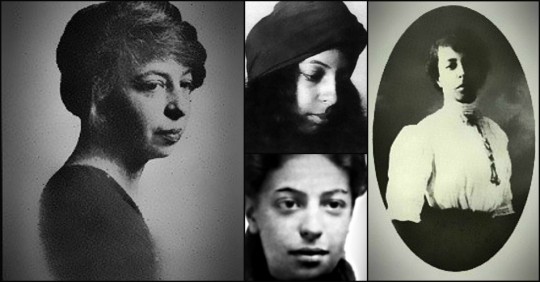
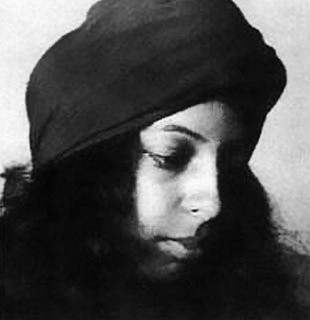



Angelina Weld Grimké (February 27, 1880 – June 10, 1958) was an American journalist, teacher, playwright and poet who came to prominence during the Harlem Renaissance. She was one of the first Woman of Colour/Interracial women to have a play publicly performed.
Life and career
Angelina Weld Grimké was born in Boston, Massachusetts, in 1880 to a biracial family. Her father, Archibald Grimké, was a lawyer and also of mixed race, son of a white planter. He was the second African American to have graduated from Harvard Law School. Her mother, Sarah Stanley, was European American from a Midwestern middle-class family. Information about her is scarce.
Grimké's parents met in Boston, where he had established a law practice. Angelina was named for her father's paternal white aunt Angelina Grimké Weld, who with her sister Sarah Grimké had brought him and his brothers into her family after learning about them after his father's death. (They were the "natural" mixed-race sons of her late brother, also one of the wealthy white Grimké planter family.)
When Grimké and Sarah Stanley married, they faced strong opposition from her family, due to concerns over race. The marriage did not last very long. Soon after their daughter Angelina's birth, Sarah left Archibald and returned with the infant to the Midwest. After Sarah began a career of her own, she sent Angelina, then seven, back to Massachusetts to live with her father. Angelina Grimké would have little to no contact with her mother after that. Sarah Stanley committed suicide several years later.
Angelina's paternal grandfather was Henry Grimké, of a large and wealthy slaveholding family based in Charleston, South Carolina. Her paternal grandmother was Nancy Weston, an enslaved woman of mixed race, with whom Henry became involved as a widower. They lived together and had three sons: Archibald, Francis and John (born after his father's death in 1852); they were majority white in ancestry. Henry taught Nancy and the boys to read and write. Among Henry's family were two sisters who had opposed slavery and left the South before he began his relationship with Weston; Sarah and Angelina Grimké became notable abolitionists in the North. The Grimkés were also related to John Grimké Drayton of Magnolia Plantation near Charleston, South Carolina. South Carolina had laws making it difficult for an individual to manumit slaves, even their own children born into slavery. Instead of trying to gain the necessary legislative approval for each manumission, wealthy fathers often sent their children north for schooling to give them opportunities, and hoping they would stay to live in a free state.
Angelina's uncle, Francis J. Grimké, graduated from Lincoln University, PA and Princeton Theological Seminary. He became a Presbyterian minister in Washington, DC. He married Charlotte Forten. She became known as an abolitionist and diarist. She was from a prominent family of color in Philadelphia who were strong abolitionists.
From the ages of 14 to 18, Angelina lived with her aunt and uncle, Charlotte and Francis, in Washington, DC and attended school there. During this period, her father was serving as US consul (1894 and 1898) to the Dominican Republic. Indicating the significance of her father's consulship in her life, Angelina later recalled, "it was thought best not to take me down to [Santo Domingo] but so often and so vivid have I had the scene and life described that I seem to have been there too."
Angelina Grimké attended the Boston Normal School of Gymnastics, which later developed as the Department of Hygiene of Wellesley College. After graduating, she and her father moved to Washington, D.C. to be with his brother Francis and family.
In 1902, Grimké began teaching English at the Armstrong Manual Training School, a black school in the segregated system of the capitol. In 1916 she moved to a teaching position at the Dunbar High School for black students, renowned for its academic excellence, where one of her pupils was the future poet and playwright May Miller. During the summers, Grimké frequently took classes at Harvard University, where her father had attended law school.
Around 1913, Grimké was involved in a train crash which left her health in a precarious state. After her father took ill in 1928, she tended to him until his death in 1930. Afterward, she left Washington, DC, for New York City, where she settled in Brooklyn. She lived a quiet retirement as a semi-recluse. She died in 1958.
Literary career
Grimké wrote essays, short stories and poems which were published in The Crisis, the newspaper of the NAACP, edited by W.E.B. Du Bois; and Opportunity. They were also collected in anthologies of the Harlem Renaissance: The New Negro, Caroling Dusk, and Negro Poets and Their Poems. Her more well-known poems include "The Eyes of My Regret", "At April", "Trees" and "The Closing Door". While living in Washington, DC, she was included among the figures of the Harlem Renaissance, as her work was published in its journals and she became connected to figures in its circle. Some critics place her in the period before the Renaissance. During that time, she counted the poet Georgia Douglas Johnson as one of her friends.
Grimké wrote Rachel – originally titled Blessed Are the Barren – one of the first plays to protest lynching and racial violence. The three-act drama was written for the National Association for the Advancement of Colored People (NAACP), which called for new works to rally public opinion against D. W. Griffith's recently released film, The Birth of a Nation (1915), which glorified the Ku Klux Klan and portrayed a racist view of blacks and of their role in the American Civil War and Reconstruction in the South. Produced in 1916 in Washington, D.C., and subsequently in New York City, Rachel was performed by an all-black cast. Reaction to the play was good. The NAACP said of the play: "This is the first attempt to use the stage for race propaganda in order to enlighten the American people relating to the lamentable condition of ten millions of Colored citizens in this free republic."
Rachel portrays the life of an African-American family in the North in the early 20th century. Centered on the family of the title character, each role expresses different responses to the racial discrimination against blacks at the time. The themes of motherhood and the innocence of children are integral aspects of Grimké's work. Rachel develops as she changes her perceptions of what the role of a mother might be, based on her sense of the importance of a naivete towards the terrible truths of the world around her. A lynching is the fulcrum of the play.
The play was published in 1920, but received little attention after its initial productions. In the years since, however, it has been recognized as a precursor to the Harlem Renaissance. It is one of the first examples of this political and cultural movement to explore the historical roots of African Americans.
Grimké wrote a second anti-lynching play, Mara, parts of which have never been published. Much of her fiction and non-fiction focused on the theme of lynching, including the short story, "Goldie." It was based on the 1918 lynching in Georgia of Mary Turner, a married black woman who was the mother of two children and pregnant with a third.
Sexuality
At the age of 16, Grimké wrote to a friend, Mary P. Burrill:
I know you are too young now to become my wife, but I hope, darling, that in a few years you will come to me and be my love, my wife! How my brain whirls how my pulse leaps with joy and madness when I think of these two words, 'my wife'"
Two years earlier, in 1903, Grimké and her father had a falling out when she told him that she was in love. Archibald Grimké responded with an ultimatum demanding that she choose between her lover and himself. Grimké family biographer Mark Perry speculates that the person involved may have been female, and that Archibald may already have been aware of Angelina's sexual leaning.
Analysis of her work by modern literary critics has provided strong evidence that Grimke was lesbian or bisexual. Some critics believe this is expressed in her published poetry in a subtle way. Scholars found more evidence after her death when studying her diaries and more explicit unpublished works. The Dictionary of Literary Biography: African-American Writers Before the Harlem Renaissance states: "In several poems and in her diaries Grimké expressed the frustration that her lesbianism created; thwarted longing is a theme in several poems." Some of her unpublished poems are more explicitly lesbian, implying that she lived a life of suppression, "both personal and creative.”
Wikipedia
3 notes
·
View notes
Photo
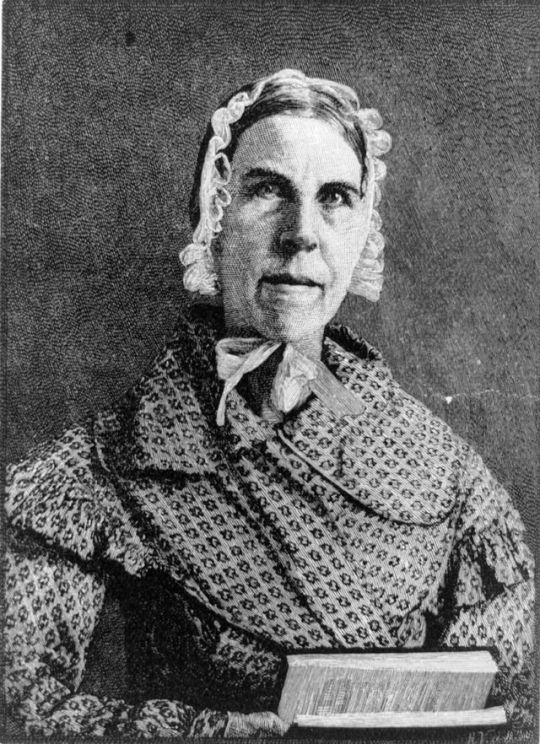
Sarah Moore Grimké (1792-1873) was a prominent abolitionist and member of the women’s suffrage movement in the United States.
Her early experiences of being prevented from gaining the same level education as boys, and instead being confined to embroidery and music classes, shaped her feminist views. She started touring the United States with her younger sister, lecturing on abolition and women’s rights. She is the author of several anti-slavery books, and inspired future generations of feminists.
#born on this day#amazing women#sarah moore grimke#civil rights#women's rights#activism#women activists#feminist#feminism
153 notes
·
View notes
Photo
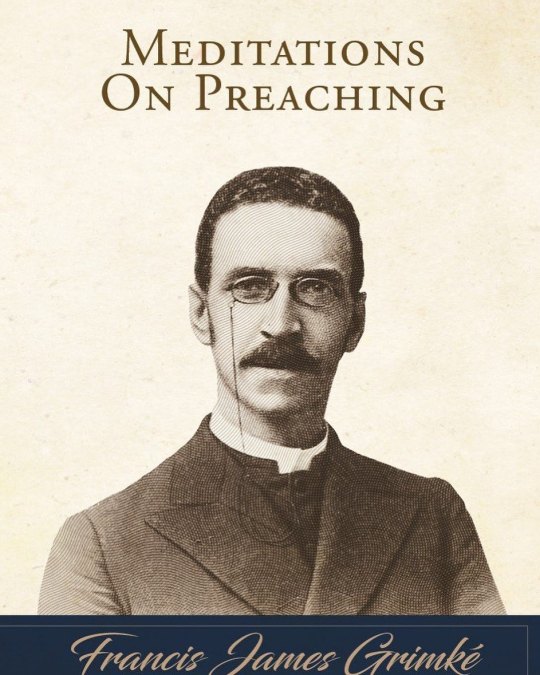
Francis James Grimké (October 10, 1850 – October 11, 1937) was a Presbyterian Minister in DC. He was regarded for more than half a century as one of the leading African-American clergies of his era and was prominent in working for equal rights. He was active in the Niagara Movement and helped found the NAACP in 1909. For was the second of three sons born to Henry Grimké, a white (European-American) slaveholder of Charleston, and Nancy Weston, an enslaved woman of European and African descent. She was his official domestic partner in the house and she and her children were his slaves. Both Henry and Nancy gave Francis and his brothers -- Archibald and John—their first lessons in reading and writing. Henry Grimké had come from a large family. Among them were two sisters, Sarah and Angelina Grimké, who had become abolitionists and moved to the North to join activists there. His other siblings continued to represent and carry out the expected roles, as he mostly did, of their prominent slaveholding family of Charleston. Francis and Archibald both graduated from Lincoln University in 1870. He went on to graduate studies at Princeton Theological Seminary, from which he graduated in 1878. He became pastor of the Fifteenth Street Presbyterian Church in DC, a post he held until 1928. On Christmas Eve, 1918, Rev. Grimke delivered the sermon below summarizing the aims and objectives of the recently ended WWI as well as its potential impact on the darker races of the world. #africanhistory365 #africanexcellence https://www.instagram.com/p/CV2nztELz-i2HdN6WJtznq3nFaa1sBSamtXR340/?utm_medium=tumblr
0 notes